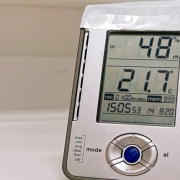Omicron ‘less severe’ than delta for children ages 4 and younger
New research from Case Western Reserve University School of Medicine suggests that the children younger than age 5 who are infected with the COVID-19 omicron variant have less risk of severe health outcomes than those infected with the delta variant.
The study, published in JAMA Pediatrics, is the first large-scale research effort to compare the health outcomes of coronavirus infection from omicron to delta in children 4 and younger—the age group not yet able to be vaccinated.
The findings show that the omicron variant is six to eight times more infectious than the delta variant. The severe clinical outcomes ranged from a 16% lower risk for emergency room visits to 85% less risk for mechanical ventilation. And about 1.8% of children infected with omicron were hospitalized, compared to 3.3% with delta.
The Case Western Reserve-led team analyzed the electronic health records of more than 651,640 children in the United States who had medical encounter with healthcare organizations between September 2021 and January 2022—including more than 22,772 children infected with omicron in late December and late January—to more than 66,000 children infected when delta was prevalent in the fall. The study also compared the records of more than 10,000 children immediately before the detection of omicron in the U.S. but when delta was still predominant.
Children younger than 5 are not yet eligible for COVID-19 vaccines and have a low rate of previous SARS-CoV-2 infections, which also limits their pre-existing immunity.
Release date: 01 April 2022
Source: Case Western Reserve University









